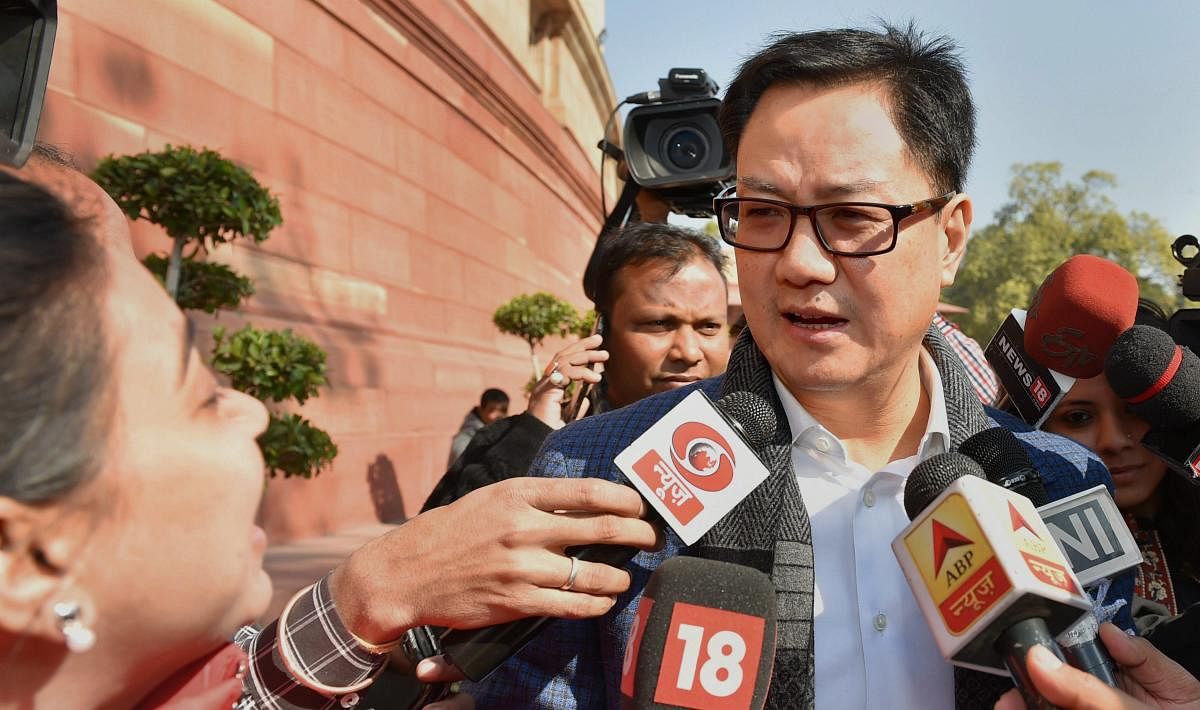
Union minister Kiren Rijiju on Sunday said the Centre did not introduce the citizenship amendment bill in Rajya Sabha respecting the interests of the people of northeastern states.
The people of the region, he said, had staged protests without understanding the pros and cons of the citizenship amendment bill.
The government, respecting their sentiments, had decided not to introduce the bill in the Rajya Sabha though many states were supporting it, the Union minister of state for home told reporters here.
The controversial bill, passed in the Lok Sabha on January 8, sought to provide Indian citizenship to non-Muslims from Bangladesh, Pakistan and Afghanistan after seven years of residence in India instead of 12 years, which is the norm currently, even if they do not possess any documents. It is now set to lapse on June 3.
Rijiju claimed that the bill would in no way affect Arunachal Pradesh, from where he hails, as it is governed by a different set of laws and under the Bengal Eastern Frontier Regulation Act.
People from other states need to take Inner Line Permit to enter Arunachal Pradesh, while foreigners need to obtain Protected Area Permit (PAP) and Restricted Area Permit (RAP), he pointed.
"I am committed to protect the interests and rights of the people of state," he added.
Rijiju will contest from the Arunachal West constituency in the general elections. Former chief minister Nabam Tuki has been pitched against him by the Congress.
Arunachal will witness simultaneous polls to the assembly and the Lok Sabha.
Rijiju said the opposition had raised the issue of granting refugee status to Tibetans, Chakmas and Hajongs, who are residing in the state, without the knowledge of the ground reality.
The Tibetan refugees who came to India in 1959 and are settled in five refugee camps in the state, are not willing to take citizenship of India even if the Supreme Court grants it to them as they are fighting for their country's freedom, he said.
A few Tibetans who married locals and tried to obtain citizenship certificate by illegal means were denied it, he said.
"When I came to know about the issue, I had said that the old Tibetan rehabilitation policy should be made clear and well defined with information on how many Tibetans are residing in the state so that in the future no refugees can get the rights and benefits of indigenous tribal people," Rijiju said.
But people misinterpreted it and give a different colour to the issue, he added.
On the contentious Chakma and Hajong refugee issue, he said the Gauhati High Court had in 1996 directed that the process of granting citizenship to the refugees should be started.
He said the Supreme Court in an order in 2015 had directed the state government to provide citizenship to the refugees within three months.
However, the Home Ministry changed the old policy and submitted to the apex court that there would be problems in implementing the order in the state as the refugees settled by the erstwhile Congress regime are illegal.
"For this, as of now, they have not been granted citizenship despite court order and the rights of the tribal people have been protected," he said.
Referring to the issue of a permanent resident certificate to non-Arunachalees, a movement against which claimed three lives earlier this year, Rijiju alleged that Arunachal PCC president Takam Sanjoy had spoken in support of the issue a few months ago but later dragged his name and misled the people.
Even Prime Minister Narendra Modi during an election rally at Aalo on Saturday had categorically said the Centre will not work against the interest of the tribal people and will work to protect their culture, tradition and rights, he added.
The Union minister said that the Armed Forces Special Powers Act (AFSPA) has been withdrawn from many states and in Arunachal, it is limited to the three eastern districts of Tirap, Changlang and Longding and four police stations of adjoining districts with Assam.
"Our efforts will be to withdraw AFSPA from the remaining parts of the state soon after getting reports from the state government on the improvement of law and order," he added.
Asked whether the Centre is willing for talks with ULFA(I) chief Paresh Barua, Rijiju said the government recognises only the pro-talk faction of the outfit led by Arabinda Rajkhowa.
"Paresh Barua has linked with many underground groups who are against India. We cannot compromise on our sovereignty," he added.